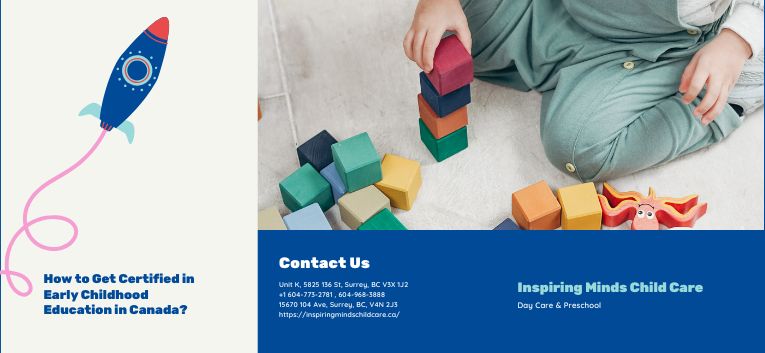
How to Get Certified in Early Childhood Education in Canada?
Choosing a career in early childhood education (ECE) is a meaningful step for anyone passionate about nurturing young minds. With increasing demand for qualified childcare professionals, especially in growing communities like Surrey, BC, it’s never been a better time to consider this fulfilling profession. If you’re wondering how to get certified in early childhood education in Canada, this guide will walk you through the steps, from education to licensing—and beyond.
Step 1: Understand the Role of an Early Childhood Educator
Early Childhood Educators (ECEs) are responsible for shaping the foundational years of children—typically from birth to age 5. They work in environments such as daycare centres, kindergartens, and preschools in Surrey BC, focusing on emotional, social, cognitive, and physical development. As an ECE, you’ll create learning plans, monitor development, and support children during one of the most critical stages of their lives.
Step 2: Choose the Right Childcare Training Program
To become certified, you must complete a recognized childcare training program. These programs are typically offered by colleges, universities, and private institutions throughout Canada. The most common certifications include:
-
ECE Certificate (Level 1 or Basic): Introductory training for entry-level positions.
-
ECE Diploma (Level 2 or Intermediate): More in-depth training with practicum placements.
-
ECE Advanced or Post-Basic (Level 3): Specialized areas like Infant/Toddler or Special Needs.
When choosing among the many childcare courses in Canada, ensure the institution is accredited and the program meets provincial certification standards. Programs generally include both classroom instruction and supervised practicum placements, which give you hands-on experience in real childcare settings.
Step 3: Meet Provincial Certification Requirements
In Canada, childcare certification is regulated at the provincial level, so requirements may vary depending on where you plan to work. For instance, in British Columbia (BC), you’ll need to apply to the Early Childhood Educator Registry to become a licensed ECE. Some common provincial requirements include:
-
Completion of an approved ECE program
-
Criminal record check
-
First aid certification
-
Minimum hours of practicum experience
If you’re aiming to work in preschools in Surrey BC, you’ll follow the guidelines set by BC’s Ministry of Education and Child Care. The good news is that many childcare training programs are specifically tailored to meet these provincial needs.
Step 4: Consider Specializations
Once you’ve completed your basic ECE certification, you may want to expand your qualifications. Specialized training allows you to work with different age groups or children with diverse needs. For example:
-
Infant and Toddler Certification: Prepares you to work with children under 3 years old.
-
Special Needs Certification: Equips you to support children with developmental or learning disabilities.
Many childcare courses in Canada offer add-on modules or additional diplomas for these specialties, which can also lead to higher earning potential and job stability.
Step 5: Apply for Jobs and Start Your Career
Once certified, you’ll be ready to apply for positions in licensed daycare centres, educational facilities, and preschools in Surrey BC and beyond. Start by exploring job postings through local childcare networks, online job boards, or reaching out to organizations like Inspiring Minds Child Care, which offer inclusive and enriching environments for young learners.
Employers typically look for candidates who are not only certified but also demonstrate warmth, patience, and the ability to connect with children and families. Don’t underestimate the value of your practicum experience—it often leads to full-time job offers.
Step 6: Stay Current and Renew Certifications
Education doesn’t stop once you’re certified. Most provinces require ECEs to renew their certification periodically, which involves continuing education. Staying current with new research, classroom techniques, and child development strategies is crucial for career advancement.
Look for professional development workshops, online training sessions, or additional childcare courses in Canada to keep your knowledge sharp and your certification active.
Final Thoughts
Becoming a certified Early Childhood Educator in Canada is a rewarding journey that starts with the right childcare training program and leads to a career full of purpose. Whether you dream of shaping young lives in bustling cities or growing communities like Surrey BC, the path is clear: invest in quality education, gain hands-on experience, and stay committed to lifelong learning.
The early years of a child’s life lay the groundwork for their future—and with the right certification, you can play a vital role in building that foundation.




